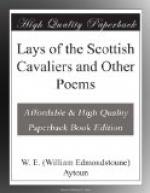Locheill was more fortunate than others of his friends and neighbours. According to Drummond,—“Major Menzies, who, upon his arrival, had observed the whole forces of the kingdom ready to invade the Highlands, as he wrote to General Buchan, foreseeing the unhappy consequences, not only begged that general to send expresses to all parts with orders immediately to submit, but also wrote to Sir Thomas Livingston, praying him to supplicate the Council for a prorogation of the time, in regard that he was so excessively fatigued, that he was obliged to stop some days to repose a little; and that though he should send expresses, yet it was impossible they could reach the distant parts in such time as to allow the several persons concerned the benefit of the indemnity within the space limited; besides, that some persons having put the Highlanders in a bad temper, he was confident to persuade them to submit, if a further time were allowed. Sir Thomas presented this letter to the Council on the 5th of January, 1692, but they refused to give any answer, and ordered him to transmit the same to Court.”
The reply of William of Orange was a letter, countersigned by Dalrymple, in which, upon the recital that “several of the chieftains and many of their clans had not taken the benefit of our gracious indemnity,” he gave orders for a general massacre. “To that end, we have given Sir Thomas Livingston orders to employ our troops (which we have already conveniently posted) to cut off these obstinate rebels by all manner of hostility; and we do require you to give him your assistance and concurrence in all other things that may conduce to that service; and because these rebels, to avoid our forces, may draw themselves, their families, goods, or cattle, to lurk or be concealed among their neighbours: therefore, we require and authorise you to emit a proclamation to be published at the market-crosses of these or the adjacent shires where the rebels reside, discharging upon the highest penalties the law allows, any reset, correspondence, or intercommuning with these rebels.” This monstrous mandate, which was in fact the death-warrant of many thousand innocent people, no distinction being made of age or sex, would, in all human probability, have been put into execution, but for the remonstrance of one high-minded nobleman. Lord Carmarthen, afterwards Duke of Leeds, accidentally became aware of the proposed massacre, and personally remonstrated with the monarch against a measure which he denounced as at once cruel and impolitic. After much discussion, William, influenced rather by an apprehension that so savage and sweeping an act might prove fatal to his new authority, than by any compunction or impulse of humanity, agreed to recall the general order, and to limit himself, in the first instance, to a single deed of butchery, by way of testing the temper of the nation. Some difficulty seems to have arisen in the selection of the fittest victim. Both Keppoch and Glencoe were named, but the personal rancour of Secretary Dalrymple decided the doom of the latter. The Secretary wrote thus:—“Argyle tells me that Glencoe hath not taken the oath, at which I rejoice. It is a great work of charity to be exact in rooting out that damnable set.” The final instructions regarding Glencoe, which were issued on 16th January, 1692, are as follows:—




